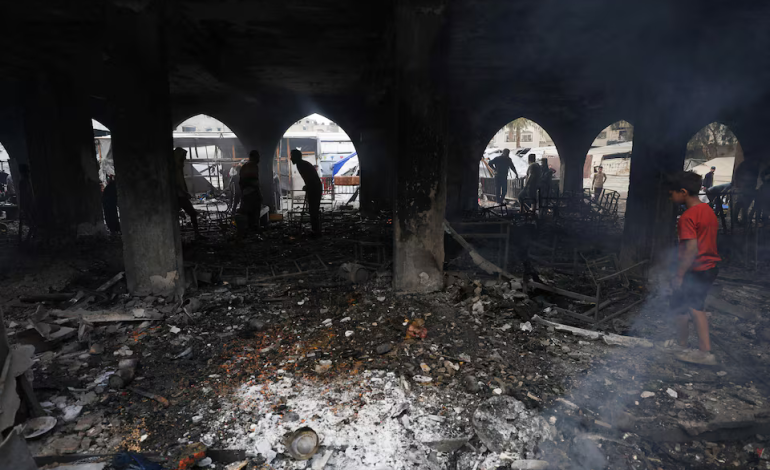Israeli Airstrike in Gaza Kills 23 Amid Ongoing Efforts for Long-Term Truce

An overnight Israeli airstrike on a school sheltering displaced families in Gaza City killed at least 23 people, according to local officials.
The strike, which ignited tents and classrooms, comes as Egyptian and Qatari mediators continue to negotiate a long-term ceasefire between Israel and Hamas.
The Israeli military has not yet commented on the strike. It maintains that it targets militants and attributes civilian casualties to Hamas’s presence in densely populated areas. In addition to the attack on the school, six more people were killed in separate incidents across the territory, including twin five-year-old girls.
The latest violence coincides with renewed diplomatic efforts. Arab mediators are developing a proposal that would establish a five-to-seven-year truce, facilitate the release of all remaining hostages held by Hamas, and lead to a gradual Israeli military withdrawal from Gaza. The plan would also establish a governing body of politically independent technocrats to oversee the enclave.
France, Germany, and Britain issued a joint statement condemning Israel’s ongoing blockade on Gaza, calling the restriction of essential supplies, including food, “intolerable.” The three countries also criticized recent statements from Israeli officials suggesting that parts of Gaza would be held indefinitely.
Palestinian President Mahmoud Abbas urged Hamas to release hostages in an effort to deny Israel justification for continued military operations. However, his comments, which included unusually strong language directed at Hamas, drew criticism from the group. Hamas responded that such statements undermine Abbas’s claim to future leadership in Gaza.
Hamas officials say they are open to a long-term truce if it includes a full Israeli withdrawal and international guarantees. Potential guarantors named include the United Nations Security Council, Turkey, Russia, and China.
Israel and the United States, meanwhile, continue to insist that Hamas be disarmed and removed from Gaza. Officials say any long-term arrangement must ensure that Hamas cannot reestablish its military capabilities. Previous temporary ceasefire proposals have failed, as Hamas demands guarantees for a lasting end to the conflict.
Since the breakdown of a ceasefire agreement in March, more than 1,600 Palestinians have been killed in Israeli strikes, according to Gaza’s Health Ministry. The Israeli military has also expanded its ground operations, now controlling about half of the territory.
Health facilities and civilian infrastructure remain severely affected. On Wednesday, a missile strike damaged the intensive care unit of Gaza’s Durra Children’s Hospital and destroyed its solar power system. No casualties were reported at the hospital.
Gaza’s Civil Defense says many victims remain under rubble due to ongoing bombardments and damage to rescue equipment. Israeli forces said they targeted 40 engineering vehicles, alleging they were used in militant activities.
The assault on Gaza began on October 7, 2023, after Hamas-led militants killed approximately 1,200 civilians and military personnel in southern Israel and took 251 hostages. Since then, at least 51,000 Palestinians have been killed by Israel, according to health authorities in Gaza. Israel claims around 20,000 of the deceased were militants but has not provided specific evidence.
Al Jazeera, the Associated Press, and Reuters contributed to this report.









The latest news in your social feeds
Subscribe to our social media platforms to stay tuned